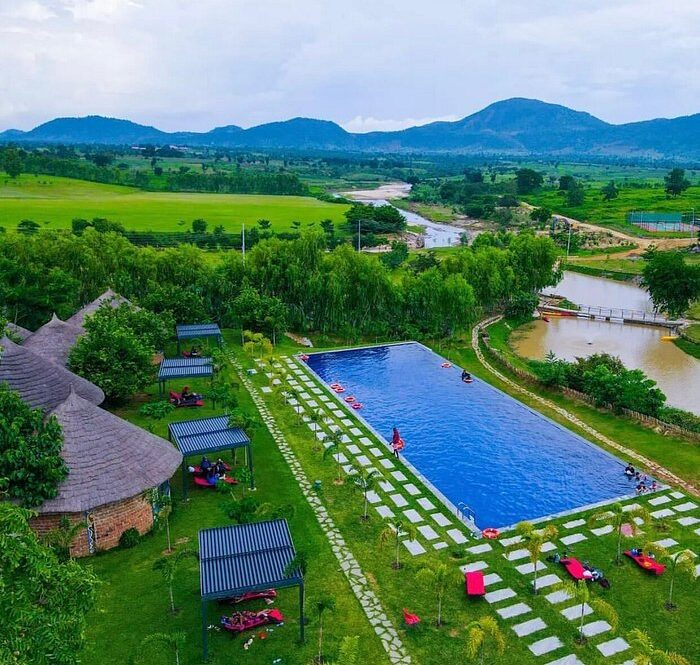In this blog post, we will explore the remarkable journey of Almat Farms, a lush green 22-hectare land located in Abuja, Nigeria. What began as a simple garden for picnics transformed into a thriving organic farm and agrotourism destination. The visionary behind this extraordinary venture is Leila, one of the three owners, a true entrepreneur, and an advocate for women in business.
Lila is a woman with a remarkable list of achievements: an interior designer, furniture manufacturer, restaurant chain owner, a skill-building school founder, and an author of two books. Her motivation? To challenge the notion that women are limited in their capabilities.
She firmly believes that women are capable of much more than societal norms often dictate. Her love for financial success and the comfort it brings fueled her journey to turn a humble garden into a thriving agrotourism destination.
The Early Days:
The story of Almat Farms is a testament to the power of dreams and determination. Leila shares that the initial idea was modest, merely a desire to create a pleasant garden for people to enjoy picnics. However, as time passed, the vision expanded, fueled by the encouragement of others. Today, this once-barren land hosts a diverse range of attractions, showcasing how agrotourism can prosper in Africa.
A Unique Multi-Millionaire Farm:
Almat Farms is a testament to the endless possibilities of agrotourism, combining hospitality, restaurants, a ranch, and a productive farm. Leila and her team have created a one-of-a-kind destination that stands out in Abuja. The farm’s uniqueness lies in its organic farming practices, including the cultivation of vegetables that were previously only available abroad. Moreover, they offer attractions like a petting zoo, game areas, an infinity pool, kayaking, and horseback riding, catering to a wide audience.
Certainly, let’s delve deeper into the Agriculture and Agrotourism sections of Almat Farms, as they play a pivotal role in its success and unique appeal.
Agriculture at Almat Farms
The agricultural aspect of Almat Farms is not your typical farm. It specializes in cultivating vegetables that are often considered exotic and are typically imported. This is a notable departure from conventional farming practices, especially in Abuja, and sets Almat Farms apart as a trendsetter in the local agriculture scene.
1. Exotic Vegetable Farming: Almat Farms takes pride in growing vegetables that are rarely found within Nigeria. These include various gourmet vegetables and greens that are more commonly associated with foreign cuisines. This choice of crops not only reflects the founders’ innovative spirit but also caters to a growing market of consumers looking for unique culinary experiences.
2. Supply to Supermarkets: A significant portion of the farm’s produce is supplied to supermarkets in Abuja. This establishes Almat Farms as a reliable source of high-quality, fresh vegetables for the city’s residents. By bridging the gap between locally produced and imported vegetables, the farm contributes to reducing the country’s dependence on foreign imports.
3. Agriculture’s Dependability: Agriculture is often considered one of the most reliable business sectors, primarily because it deals with the production of essential commodities – food. Almat Farms recognizes this and has strategically leveraged it as a core revenue-generating activity.
Agrotourism: An Immersive Experience
While the agricultural sector is fundamental to Almat Farms, the agrotourism aspect is equally significant. The farm’s lush green landscape and diverse attractions make it a sought-after destination for both tourists and locals looking for a unique experience.
1. Chalets and Accommodations: Almat Farms offers guests the opportunity to stay in comfortable chalets within the serene surroundings of the farm. This allows visitors to immerse themselves in the farm’s lifestyle and appreciate the beauty of agriculture and rural life.
2. Recreational Activities: The farm provides a range of recreational activities, including a petting zoo for children, an infinity pool for experienced swimmers, kayaking, and more. This enables visitors to enjoy the outdoors and engage in various activities, making it a well-rounded family destination.
3. Educational Experience: Agrotourism goes beyond leisure; it’s also an educational endeavor. Visitors can explore the greenhouses and pick their vegetables for meals. This hands-on experience adds an educational dimension to the farm visit, allowing guests to understand where their food comes from and appreciate the efforts involved in farming.
4. Community Engagement: Almat Farms doesn’t exist in isolation but actively engages with the local community. The farm’s impact extends beyond business to improve the lives of the people living in the vicinity. The provision of employment opportunities and the development of housing and educational facilities for a nearby Fulani settlement underscore the farm’s commitment to community development.
In summary, the interplay between agriculture and agrotourism is a defining feature of Almat Farms. By cultivating exotic vegetables and opening its doors to visitors, the farm has created a symbiotic relationship between these two sectors. The farm not only generates revenue from agriculture but also offers a holistic experience for guests, promoting awareness of farming and contributing to community welfare. It’s a shining example of how agricultural businesses can thrive and diversify by embracing the agrotourism model.
A Rapid Transformation:

From its inception in 2017 to the present day, Almat Farms has undergone significant growth and development. The team has continually expanded the facilities, including the addition of a golf course and a tennis court, setting the stage for further progress in the future.
The Heart of Agrotourism:
Almat Farms is not just about agriculture; it’s also about offering visitors an immersive experience. Guests can enjoy a unique lifestyle rarely seen in the 21st century. It’s a place where you can pick your vegetables, cook a meal, and truly connect with nature. This holistic approach to agrotourism has captured the hearts of visitors, making it a preferred destination for families and tourists.
A Purposeful Location:
Choosing the perfect location was key to the success of Almat Farms. The lush green surroundings of Abuja provided the ideal backdrop for this visionary project. Its serene ambiance and picturesque landscape make it an attractive spot for agrotourism.
Community Empowerment:
Almat Farms has not only benefited its owners but has also made a positive impact on the local community. They employ nearly 75% of their workforce from the neighboring community, providing jobs and opportunities for local residents. The farm has also invested in improving the living conditions of the Fulani settlement nearby, providing housing, clean water, and educational facilities for children.
A Unique Accommodation Experience:
The farm’s accommodations, including chalets, reflect its commitment to offering a distinctive experience. These chalets are designed for those seeking a quiet and romantic escape. Visitors can also experience traditional Northern Nigerian architecture in some of the structures, adding a touch of cultural authenticity.
Incredible Polo Facilities:
Almat Farms is not just about leisure and agriculture; it’s also home to a polo club. These facilities are an essential part of the farm, as they host Polo tournaments and maintain horses from the Netherlands. This adds a dynamic element to the farm’s offerings.
The Agricultural Impact:
While Almat Farms provides an array of attractions and accommodations, at its core, it remains an agricultural enterprise. The farm cultivates a variety of crops, including tomatoes and strawberries, with impressive yields. The agricultural side of the business is just as important, if not more so, than the tourism aspect. They also supply fresh vegetables to supermarkets in Abuja, underlining the practicality and sustainability of their approach.
A Testament to Women in Business:
Leila’s personal journey is inspiring. She started as an interior designer, ventured into furniture manufacturing, owns a chain of restaurants, operates a skill-building school, and is a published author. Her story defies stereotypes, proving that women can excel in multiple fields and build successful businesses. Leila’s passion and relentless pursuit of her dreams serve as a shining example for aspiring female entrepreneurs.
Conclusion:
Almat Farms is not just a farm; it’s a testament to vision, hard work, and a commitment to the community. It showcases the incredible potential of agrotourism in Africa and challenges preconceived notions about women in business. As Almat Farms continues to grow and evolve, it remains a beacon of inspiration for all who visit and a symbol of hope for those who dare to dream big.












